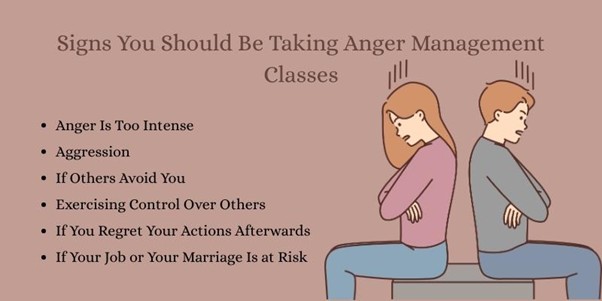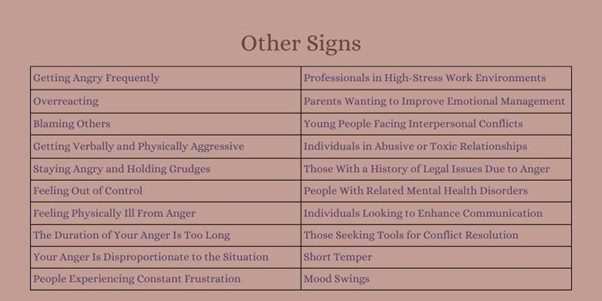26 Signs You Need Anger Management Classes
Struggling with frequent outbursts, irritability, or feeling out of control when angry? These could be signs you need anger management classes. If left unaddressed, unmanaged anger can harm your health, relationships, and work life, making professional help essential. Explore our anger management classes to take control before things escalate.
Signs You Should Be Taking Anger Management Classes

Anger is a normal emotion—but when it becomes too intense, frequent, or harmful to yourself or others, it’s time to take action. Below are key warning signs that suggest you may benefit from professional help through anger management classes.
1. Anger Is Too Intense
If your anger feels explosive or uncontrollable, it’s likely more than just a bad day. Intense anger often shows up as yelling, throwing objects, or experiencing physical tension like clenched fists or a pounding heart.
Such strong emotional reactions can scare others—and even yourself—especially if they seem to happen over minor triggers. Anger management classes can help you identify these moments early and teach you how to defuse them in a healthier way.
2. Aggression
Anger that turns into verbal or physical aggression, like name-calling, threats, or violence, is a clear red flag. If your anger causes harm or fear, it’s a serious sign you need support. Anger management helps break this cycle and rebuild safe communication patterns.
3. If Others Avoid You
Are friends, family, or coworkers distancing themselves? If people seem to “walk on eggshells” around you or avoid conversations, it may be because your anger feels unsafe to them. This is often a sign that your emotional responses are affecting your relationships more than you realize.
4. Exercising Control Over Others Through Intimidation
Using anger to control situations—through yelling, glaring, or threatening—is a form of emotional intimidation. While it may bring short-term control, it damages trust and respect long term. Anger management teaches healthier ways to communicate without force or fear.
5. If You Regret Your Actions After an Anger Episode
Do you often feel guilt or shame after an outburst? Regret is a sign that your anger is outpacing your values. Learning to pause and respond instead of react can help you avoid saying or doing things you’ll later wish you hadn’t.
6. If Your Job or Your Marriage/Relationship Is at Risk
When anger threatens your career or your closest relationships, it’s time to act. Missed promotions, warnings at work, or constant fights with your partner are signs that unmanaged anger is taking a toll. Anger management can help you protect what matters most.
Other Signs/Ways You May Need Anger Management Classes

In addition to obvious outbursts, anger can appear in many forms—some subtle, others persistent. Below are additional signs and life situations that may indicate it’s time to consider anger management classes for healthier emotional regulation.
7. Getting Angry Frequently
If you find yourself angry almost daily or snapping at people over small issues, it’s more than just stress. Frequent anger points to underlying frustration or emotional buildup that hasn’t been processed.
This repeated reaction can slowly damage your relationships and mental health. Anger management classes teach how to recognize early signs and reduce the emotional charge before it becomes overwhelming.
8. Overreacting
Overreaction happens when your emotional response is far stronger than the situation requires—like yelling over spilled coffee or shutting down after a disagreement.
These reactions often stem from deeper emotional pain or unresolved issues. Anger management helps you identify triggers and respond with clarity instead of emotional overload.
9. Blaming Others
Constantly blaming others when things go wrong is a defense mechanism rooted in anger and avoidance. It can make conflict worse and prevent self-growth.
Anger management encourages personal accountability while giving tools to handle frustration without deflecting or assigning fault unfairly.
10. Getting Verbally and Physically Aggressive
Yelling, swearing, throwing objects, or pushing someone physically are serious signs of uncontrolled anger. These actions often scare others and lead to legal or relationship consequences.
Anger management helps individuals identify internal tension before it becomes aggression, and teaches healthy release methods like breathing, grounding, or assertive communication.
11. Staying Angry and Holding Grudges
If you find it hard to let go of past conflicts or often replay arguments in your mind, it could mean your anger has turned into resentment.
Holding grudges affects your peace of mind and keeps you emotionally stuck. Anger management classes can guide you in practicing forgiveness, emotional release, and moving forward.
12. Feeling Out of Control
When anger feels like it “takes over” and you say or do things you later regret, that’s a loss of control. This can lead to shame and worsening mental health.
Learning to pause and regulate your responses is a central part of anger management, helping you feel empowered instead of powerless during emotional moments.
13. Feeling Physically Ill From Anger
Frequent anger can show up physically—headaches, tense muscles, stomach problems, or even high blood pressure.
These symptoms are your body’s way of saying something’s wrong. Anger management can improve both your mental and physical well-being by teaching relaxation techniques and stress regulation.
14. The Duration of Your Anger Is Too Long
It’s normal to feel angry sometimes, but if you stay upset for hours or days, it may indicate emotional rumination or unresolved conflict.
This prolonged anger drains your energy and focus. Anger management teaches techniques to process emotions more quickly and move on without bottling them up.
15. Your Anger Is Disproportionate to the Situation at Hand
If minor annoyances cause major reactions, like screaming during a traffic jam or slamming doors over a comment, your emotional response might not match the situation.
This disconnect suggests a deeper trigger or pattern. Anger management helps uncover those triggers and trains you to assess situations more realistically.
16. People Experiencing Constant Frustration
When you feel annoyed or on edge all the time, even in neutral situations, it’s a red flag. Constant frustration makes daily life exhausting and relationships tense.
Anger management helps uncover the root causes—like unmet needs, burnout, or miscommunication—and equips you with tools to manage them productively.
17. Professionals in High-Stress Work Environments
Doctors, teachers, law enforcement, and corporate leaders often face chronic stress, which can lead to irritability or angry outbursts.
Anger management helps professionals handle workplace pressure without damaging team dynamics, personal well-being, or job performance.
18. Parents Wanting to Improve Emotional Management
Parenting is rewarding but incredibly stressful, especially when balancing work, sleep, and emotional needs. Some parents may unintentionally project anger onto their children.
Anger management helps parents develop patience, communicate more effectively, and model healthy emotional behavior for their kids.
19. Young People Facing Interpersonal Conflicts
Teens and young adults often struggle with emotional regulation while navigating relationships and identity. Unchecked anger can result in broken friendships or disciplinary actions.
Anger management offers younger individuals tools to resolve conflict, express themselves respectfully, and understand their emotional patterns early on.
20. Individuals in Abusive or Toxic Relationships
Whether you’re the target or the source of anger in a toxic dynamic, recurring conflict can harm your mental health and safety.
Anger management classes can teach de-escalation, boundary-setting, and how to disengage from harmful communication patterns or cycles.
21. Those With a History of Legal Issues Due to Anger
If you’ve faced assault charges, domestic disputes, or workplace complaints, courts or employers may recommend anger management.
These programs can help prevent future incidents by focusing on impulse control, emotional awareness, and conflict resolution strategies.
22. People With Related Mental Health Disorders
Conditions like anxiety, PTSD, and depression often come with irritability or explosive reactions. In these cases, anger is a symptom of deeper distress.
Anger management can work alongside therapy or medication to create a more balanced emotional life, especially when tailored to co-existing disorders.
23 Individuals Looking to Enhance Communication Skills
Not all anger looks like yelling—some people shut down, become passive-aggressive, or use sarcasm. These habits make it hard to connect with others.
Anger management improves communication by teaching assertiveness, listening, and how to express needs without conflict.
24. Those Seeking Tools for Conflict Resolution
Whether in families, relationships, or work settings, conflict is unavoidable. But if it always turns hostile, that’s a problem.
Anger management helps individuals stay calm under pressure and solve disagreements without escalating into shouting matches or avoidance.
25. Short Temper
If you’re quick to anger with little provocation, it could be more than impatience—it might be emotional reactivity built over time.
Managing a short temper involves learning how to slow down your response, reflect before reacting, and respond with intention instead of impulse.
26. Mood Swings
Switching quickly from calm to angry, or feeling emotionally unstable, may point to underlying emotional dysregulation.
Anger management can bring stability by helping you understand emotional shifts, recognize patterns, and develop strategies to regain control.
Frequently Asked Questions
Should I get anger management classes?
If your anger feels intense, frequent, or harms your relationships or work, anger management classes can help you gain control and respond more calmly.
Should I seek anger management?
Yes, if you struggle to manage outbursts, feel regret after getting angry, or others say your anger is a problem, seeking help is a smart, proactive step.
Why do I get so angry so easily?
Quick anger can be caused by stress, unresolved trauma, poor emotional regulation, or underlying mental health issues like anxiety or depression.
What happens if you don’t go to anger management classes?
Unchecked anger can lead to damaged relationships, job loss, legal trouble, or health issues like high blood pressure and chronic stress. Getting help prevents escalation.
Conclusion
Anger is a normal emotion, but when it becomes too frequent, intense, or harmful, it’s a sign that something deeper needs your attention.
If you’ve recognized any of the signs we’ve discussed—like frequent outbursts, holding grudges, feeling out of control, or seeing your relationships suffer—anger management classes can be a powerful first step toward change.
These classes aren’t about “fixing” you; they’re about giving you the tools to understand your triggers, manage your emotions, and respond instead of react.
Whether your anger is affecting your job, your marriage, or your sense of peace, it’s never too late to take control.
Many people have transformed their lives by learning healthier ways to cope, communicate, and express themselves.
If you’re asking yourself, “Should I get anger management classes?”—that may already be your answer. Take the step. Reclaim your calm, protect your relationships, and give yourself the chance to grow emotionally stronger.


4 Responses